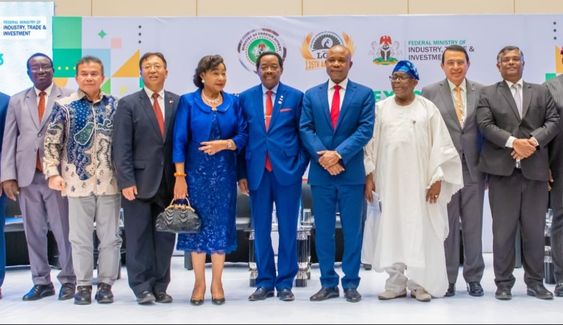Business
Mbah attracts investors with Enugu’s economic prospects

Enugu State’s governor, Dr. Peter Mbah, has invited the local and international investment community to look into investment prospects there.
Mbah made this statement on Tuesday in Lagos at the International Conference and Expo of the Lagos Chamber of Commerce and Industry (LCCI), which had the subject “Invest Nigeria”.
The state’s efforts to reduce investment risk and improve the ease of doing business were pledged to investors by the governor.
He said that the state offers a variety of lucrative investment prospects, including those in the fields of real estate, information and communication technology (ICT), tourism, logistics, and aviation.
The success of Mbah’s administration, he claimed, depended on a paradigm shift away from the conventional practise of relying solely on allocations from the Federation Account.
According to him, this was made possible by the state’s use of its substantial people and material resources in conjunction with its future and new growth plan.
“Now that Enugu is open for business, we are significantly reviewing our ‘ease of doing business’ indicators to make sure the atmosphere is favourable for business.
For instance, our updated land title procedures will make it possible to issue a Certificate of Occupancy in as little as 72 hours.
“To increase efficiency, the procedures for obtaining building approvals will also be reviewed and significantly streamlined.
In order to maintain openness in all interactions with the government and enable self-service by the general public, direct physical contact with public employees is being minimised or eliminated, all of our major government operations are being automated.
By providing access to property, supporting infrastructure, managing relationships with host communities, among other things, the governor added, “We are also willing to de-risk business investment in key sectors.”
In order to open up the capital market, draw in investors, and reclaim its position in the national and international economy, Mbah continued, his administration was forging partnerships with the private sector.
He claimed that the state was preparing to open up an additional 300,000 hectares of farmland in order to capitalise on its strong factor productivity in a few important areas of agriculture.
Cassava, soyabean, oil palm, and cashew production, which Mbah claimed had a projected $7 billion worldwide market size by 2025, are among the major crops and animal production potential.
The state’s Nsukka pepper, he continued, has developed into “a true export commodity as well as an industrial raw material for various spice brands.”
The governor pointed out that a survey had revealed that the South East and South South were actually the final destinations of roughly 40% of the air cargo imported through Lagos, making investments in logistics and aviation highly profitable.
“In order to make transit through and to Enugu effective and seamless, we are investing heavily in our logistics and aviation industry.
To do this, he stated, “we are giving the development of a cargo terminal for the Enugu International Airport a high priority in order to facilitate the direct receipt of cargo in Enugu.”
Additionally, he disclosed plans for the state’s light rail system, investments in tourism, and information and communication technology (ICT).
He continued by saying that there were plans to collaborate with the federal government to entice investors for the production of natural gas and crude oil as well as plentiful solid minerals including ironstone, zinc, lead, limestone, and kaolin that were available in large quantities.
Dr. Michael Olawale-Cole, President of LCCI, underlined in his remarks that macroeconomic stability was essential for boosting investments and the nation’s growth trajectory.
A consistent government commitment to responsible fiscal policy and inflation management, according to Olawale-Cole, is the primary prerequisite for increasing investment and fostering sustainable growth.
However, he pointed out that the current administration had shown that it was committed to promoting the expansion and security of the industrial sector as well as small enterprises.
The simplicity and cost of conducting business is another crucial factor in investment selections.
Nigeria has gradually risen in the rankings for how expensive it is to start a business, deal with licences, and enforce contracts.
“Improving regulatory standards and lowering entry barriers into the market would encourage investment and spur growth,” he said.
The LCCI President also stressed the significance of a reliable and clear legal system.
According to him, Nigeria must also tackle challenges of poverty and inequality head-on, support the middle class and consumer market, encourage high rates of return on investment, and maximise the wealth generated by its natural resource wealth.
(NAN)
